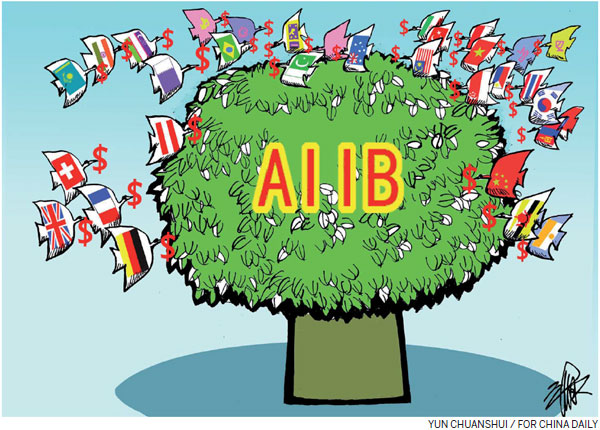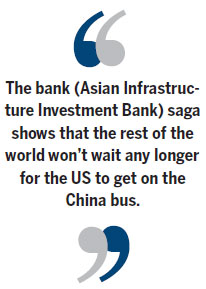China's huge diplomatic coup
Updated: 2015-04-03 07:27
By Giles Chance(China Daily Europe)
|
|||||||||||
Britain, in supporting a China-led bank, is highlighting the evolving Chinese role around the world
How should the West treat a rising global power like China? According to the United States, the correct way is to keep China outside the tent looking in. That's why the Trans-Pacific Partnership, a planned free trade consortium of Pacific nations led by the US and Japan, has not included China, which has more trade with each of the 10 potential TPP members than anyone else.
A different answer to that question came recently from another member of the world's most exclusive club, the United Nations Security Council. On March 13, Britain applied to become a founding member of the China-led $50 billion Asian Infrastructure Investment Bank. The application was timely because the deadline to apply for the bank's founding membership was March 31.

Until Britain's application, the only other signatories to the bank were Asian countries, including India, but not Japan, which offsets its geographical proximity to the Chinese mainland by standing as close as it can to the United States in China-related geopolitical and economic issues. But Washington's swift condemnation of the British announcement was too little, too late to stop other major undecided European countries from following Britain and applying to join the bank.
More than 50 countries have joined or applied to become founding members of the bank by the deadline.
With billions of Asians lacking access to clean water, electricity and sanitation, let alone schools and transport, no one disputes the need for large additional infrastructure lending in Asia. And China's record since 1980 in bringing millions of its own people out of poverty and creating a massive modern infrastructure in its huge, often unhospitable country qualify it as an appropriate leader of an Asian infrastructure initiative. What the bank dispute has highlighted, though, is China's evolving role in Asia and around the world.
In itself, the establishment of a new financing vehicle for Asian infrastructure investment is not something that would normally grab the attention of newspaper editors and TV anchors, let alone prime ministers and presidents.
But this issue represents an important stage in the inevitable competition for leadership of the global economy in the 21st century. As the incumbent power, the US naturally wants China to support international rules and the institutions it has led for 70 years. As the rising power, China is naturally challenging a status quo it had no role in creating and wants to begin shaping a modified order itself.

Against this background, Britain and other countries' decision to ignore the US and join the bank led by China signals a huge diplomatic coup for China in the face of a G7 group which had, in all things, meekly followed US leadership. The fury of the US response to the British announcement of support for the Chinese initiative shows just how accustomed the US has become to its allies staying in line and how significant the US think this moment is.
Those in the US and elsewhere opposed to the deal have criticized the British for putting commercial considerations ahead of geopolitical ones, but the British have responded by saying that they don't always agree on every matter with their American allies. Lord Palmerston, the famous British foreign minister of the early- to mid-1800s, would have approved of the British decision because his maxim was "Britain has no perpetual allies, only perpetual interests".
The debate following the British decision has focused on what leeway Western developed powers feel they can give China, the new kid on the global block. But this approach ignores the evident fact that China is capable of getting what it wants, even if the Americans don't approve. In other words, China has become an equal partner, not a supplicant of the US and the other G7 countries. The US should note that China's rise, which has occurred largely through its own efforts and not because of Western influence, hasn't just benefited its own people. It's brought major benefits to the rest of the world: lower prices for most consumer products, a huge new market for the world's multinationals, and a vital source of demand after the financial crash of 2008, without which the global recession would have been much worse.
Going forward, the Sino-US relationship is going to remain complex, tense and extremely important to both sides. The US is not ready to recognize a reduction in their control of the Pacific through an increased Chinese presence in the South China Sea, and they are watching China's modern Silk Road initiatives very closely. Meanwhile, they are searching for the appropriate way to respond to China's rise.

Sadly, Britain and other countries' action does not make US congressional approval of the new International Monetary Fund / World Bank voting structure any more likely, and the US Congress will probably continue to shun the modest changes that have been proposed (and widely approved) by the IMF and the World Bank that would give China about 6 percent of the votes, while maintaining the US' controlling interest via a 15 percent veto rule.
What the events of the last two weeks have shown is that the US cannot isolate China, but it can choose to isolate itself. It cannot force other major economies to ignore China's rising power and influence, which so far have brought more good than harm to the global community. There are many within the US who would support a new American isolationism. This may be the misguided route that it chooses to take as the world order shifts.
The bank saga shows that the rest of the world won't wait any longer for the US to get on the China bus. The central likelihood is that China will strengthen its cooperation with the rest of Asia and with Europe to develop governance structures beyond the bank that underpin its newfound economic strength and geopolitical vision, while the US sits mainly on the sidelines, still a very significant geopolitical and economic force but increasingly isolated. The alternative scenario is that the US swallows its pride, changes its negative perspective on China's emergence and welcomes China as a global partner, starting with the Trans-Pacific Partnership. It's a much more welcome and constructive vision, and would serve American (and Chinese) interests much better in the medium- and long-term.
Sadly however, the strength of the US conservativeness about the nation's superpower status and its guardianship of Western values make this scenario less likely. Although we may be dismayed by this outcome, we should at least be thankful that so far, China's global emergence has been peaceful. Long may it continue to be so.
The author is a visiting professor at Guanghua School of Management, Peking University. The views do not necessarily reflect those of China Daily.
(China Daily European Weekly 04/03/2015 page10)
Today's Top News
54 dead after Russian trawler sinks in ocean
Death toll rises to 147 in Kenya university attack
Dozens killed in Kenyan university attack
Video of final seconds aboard Germanwings plane discovered
British Prince Harry reports for duty in Australia next week
Chinese World War II veterans to receive medals from Russia
Lufthansa insurers set aside $300 mln over crash
Sarkozy makes political comeback
Hot Topics
Lunar probe , China growth forecasts, Emission rules get tougher, China seen through 'colored lens', International board,
Editor's Picks

|

|

|

|

|

|






